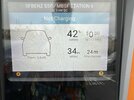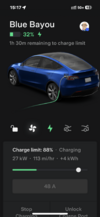CCS is supposed to be DC fast charging.. but there are pins are on the connector that also support AC charging. I don't know much about a CCS charger, but would it have a fall-back to AC charging (possibly at 208 VAC) if (a) the algorithms get confused or (b) there was something broken?
No -- at least, not in a technical sense. Most CCS1 plugs I've seen omit the AC pins entirely, so falling back from CCS1 to J1772 is simply not physically possible. I don't know the details, but I know that the CCS communications protocol is more sophisticated than the J1772 protocol. I don't know what would happen if a station
did have the AC pins connected, started communicating with CCS, and then dropped back from CCS to J1772 protocols. That is, I don't know if a car would begin "talking" J1772 and accept a Level 2 charge. I've never heard of this happening.
That said, a CCS station could certainly throttle the charge rate, or simply be designed to handle only very slow (by DC fast charging standards) charging rates. I've seen entries on PlugShare for CCS stations that support maximum charge rates in the 25kW range, which is barely more than double the 11.5kW maximum that a Wall Connector can provide on a 60A circuit. When a car charges to 100% on CCS (or CHAdeMO or Tesla's proprietary standard), the charge rate drops quite low towards the end -- slower than most Level 2 charge sessions, in fact. (A Level 2 charge to 100% also tapers near the end.) This is done at the behest of the car, to protect the battery. DC fast charging stations can also limit their charge rate from their end -- think of V2 Superchargers with two cars plugged into paired stations, for instance. I don't know what sort of granularity or minimums are built into the CCS protocol, so maybe dropping below Level 2 AC charging speeds is possible from the car's side but not from the charger's side, but I'd be a little surprised by that.
In fact, upon reviewing
@Gigaron's post, I don't see mention of the car's SoC. If it was high enough, it's conceivable that this was what was limiting the charge rate to 27kW.







